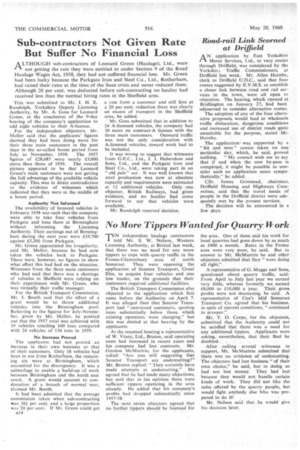Sub-contractors Not Given Rate But Suffer No Financial Loss
Page 48

If you've noticed an error in this article please click here to report it so we can fix it.
A LTHOUGH sub-contractors of Leonard Green (Haulage), Ltd., were " not getting the rate they were entitled to under Section 9 of the Road Haulage Wages Act, 1938, they had not suffered financial loss. Mr. Green had been lucky because the Parkgate Iron and Steel Co., Ltd., Rotherham, had raised their rates at the time of the Suez crisis and never reduced them, Although 20 per cent. was deducted before sub-contracting no haulier had received less than the normal hiring rates in the Sheffield area.
This was submitted to Mr. J. H. E. Randolph, Yorkshire Deputy Licensing Authority, by Mr. A. Goss for Leonard Green, at the conclusion of the 9-day hearing of the company's application to add eight vehicles to their A-licence.
For the independent objectors, Mr. Mellor said that the applicants' figures showed they had been doing more for their three main customers in the past than in the so-called boom period from July to November, 1959. The 1957 figures of £28,687 .were nearly £3,000 more than those of 1959. The overall picture appeared to be that Leonard Green's main customers were not getting the full advantage of the available vehicle capacity. This was in direct contradiction to the evidence of witnesses which indicated that they were in the middle of a boom period.
Authority Not Informed The availability of licenced vehicles in February 1958 was such that the company were able to take four vehicles from Parkgate and base them at Birmingham without informing the Licensing Authority. Their earnings out of Birmingham during the next year were £19,700 against £5,200 from Parkgate.
Mr. Green appreciated the irregularity, said Mr. Mellor, because he had now taken the vehicles back to Parkgate. There were, however, no figures to show what effect this had had on the situation. Witnesses from the three main customers who had said that there was a shortage of vehicles in Sheffield were .relying on their experiences with Mr. Green, who was virtually their traffic manager.
For the British Transport Commission, Mr. J. Booth said that the effect of a grant would be to throw additional. vehicles into the Birmingham pool. Referring to the figures for July-November, given by Mr. Mellor, he pointed out that the 1957 total was achieved with 19 vehicles totalling 100 tons compared with 24 vehicles of 134 tons in 1959.
No Increase Proved
The applicants had not proved au increase in their own business or that of their customers. Only 18 vehicles had been in use from Rotherham, the remaining six were at Birrningham, which accounted for the discrepancy, It was a subterfuge to enable a build-up of work between Birmingham and the north east coast. A grant would amount to condonation of a breach of normal -user, claimed Mr. Booth.
It had been admitted that the average commission taken when sub-contracting was 161 per cent. and a large proportion was-20 per cent. If Mr. Green could.get
1314 a rate frcrm a customer and still hire at a 20 per cent. reduction there was clearly an excess of transport in the Sheffield area, he added.
Mr. Goss submitted that in addition to 24 A-licensed vehicles, the company had 30 more on contract-A licence with the three main customers. Outward traffic was not the only consideration with A-licensed vehicles, inward work had to be included.
It was wrong to suggest that witnesses from G.E.C., Ltd., J. J. Habershon and Sons, Ltd., and the Parkgate Iron and Steel Co., Ltd., were taking part in an "old pals" act. It was well known that steel production was now at absolute capacity and requirements were estimated
at 12 additional vehicles. Only one objector, British Railways, had given evidence, and no haulier had come forward to say that vehicles were available.
Mr. Randolph reserved decision.




















































































































